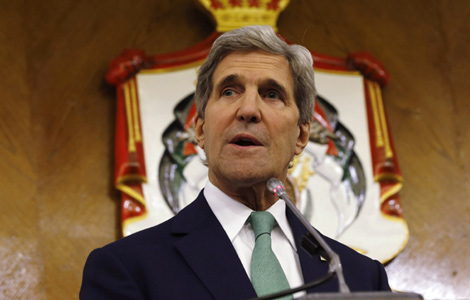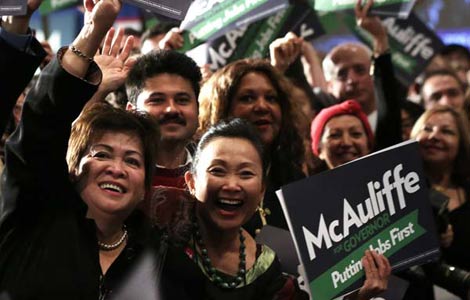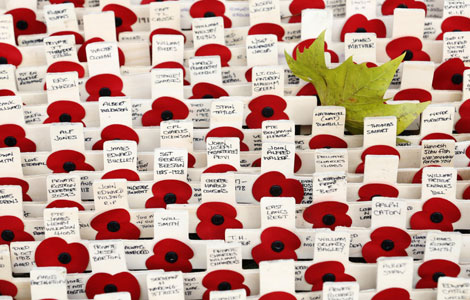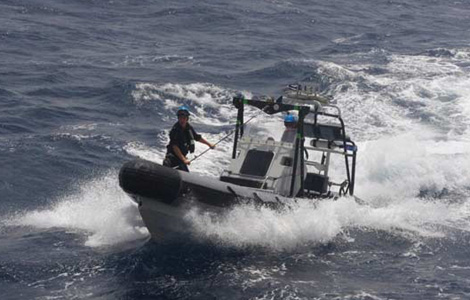Kerry to join Iran nuclear talks in bid to reach deal
Updated: 2013-11-08 09:28
(Agencies)
|
||||||||
ISRAEL SEES 'HISTORIC' MISTAKE
Israeli Prime Minister Benjamin Netanyahu said he disliked the outlines of an initial deal being hinted at in Geneva since it would allow Iran to keep a nuclear capability.
"Israel totally opposes these proposals," he said in a speech. "I believe that adopting them would be a mistake of historic proportions. They must be rejected outright."
Widely assumed to be the Middle East's only nuclear power, Israel views Iran as a threat to its existence and has warned it could carry out pre-emptive strikes on Iranian nuclear sites if diplomacy fails to restrain the programme.
In Washington, the US Senate Banking Committee chairman declared the panel was moving forward on a proposal for new sanctions, a step likely to please Israel which has campaigned against compromise proposals under discussion in Geneva, describing them as potentially "a mistake of historic proportions".
Senator Tim Johnson, a Democrat, said Senate Majority Leader Harry Reid instructed him to bring the bill closer to a vote by the full Senate by calling for a debate on it.
Araqchi, the Iranian deputy foreign minister, said after the morning meetings that he hoped a deal could be struck but "the differences are widespread and deep. This is undeniable".
The Iranian delegation held a series of meetings - one with all three European delegations, then, separately, with the Russians, the Chinese and the Americans.
Araqchi met for an hour with US delegation chief Wendy Sherman, under secretary of state for political affairs, in a meeting that a senior State Department official described as a "substantive and serious conversation".
The United States and its allies say they are encouraged by Tehran's shift to softer rhetoric since the election of Rouhani. But Western allies say Iran must back its words with action and take concrete steps to scale back its atomic work.
Washington says that would buy time for Iran and the powers to reach a broader diplomatic settlement and avert any war that could cause global economic upheaval.
"It remains our assessment that Iran would need at least one year to acquire one nuclear weapon from the time that Iran decides to pursue one," Carney said, describing the US view of a potential "breakout move" by Tehran toward building an atomic bomb. "In other words, we would be essentially buying time."
The exact nature of a possible first step remains unclear. But the six global powers are unlikely to agree on anything less than a suspension of enrichment of uranium to 20 percent fissile purity, a level that constitutes a technical milestone not far from the threshold for a nuclear warhead.
They want Iran to convert its stockpile of 20 percent uranium to an oxide form suitable for processing into reactor fuel, and take other measures to slow the programme.
A US official said Iran at this stage must address important aspects of its nuclear activity, including more intrusive U.N. inspections. Iran's construction of a research reactor near the town of Arak is also a growing concern for the West because of its potential to yield plutonium for bombs.
A senior aide to a US senator briefed by the White House and State Department said Washington would offer to work with Iran in a six-month confidence-building period. During that time Washington would offer Tehran, among other things, relaxed restrictions on Iranian funds held in overseas accounts.

 Super typhoon Haiyan slams into Philippines, at least 3 dead
Super typhoon Haiyan slams into Philippines, at least 3 dead
 50 arrested at LA protest over Wal-Mart wages
50 arrested at LA protest over Wal-Mart wages
 Kerry to join Iran nuclear talks in bid to reach deal
Kerry to join Iran nuclear talks in bid to reach deal
 Politicians court US-Asians amid anti-China sentiment
Politicians court US-Asians amid anti-China sentiment
 Britain remembers war dead
Britain remembers war dead
 Stolen newborn returned to family
Stolen newborn returned to family
 TCM firms should 'learn rules of West'
TCM firms should 'learn rules of West'
 Artists see big picture in CBD's art zone
Artists see big picture in CBD's art zone
Most Viewed
Editor's Picks

|

|

|

|

|

|
Today's Top News
Kerry says aims to close 'important gaps' in Iran nuclear tal
Kerry to join Iran nuclear talks in bid to reach deal
Lenovo profit surges on smartphone, tablet sales
Houston and Shenzhen step up business
Bank exec describes meeting with Li Keqiang
CCBOT finds platform to tackle US market
BlackBerry could pay $250m break fee
China should allow for higher inflation: economist
US Weekly

|

|







